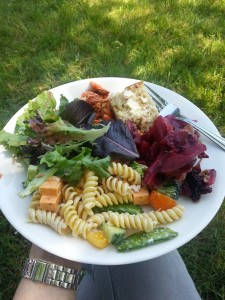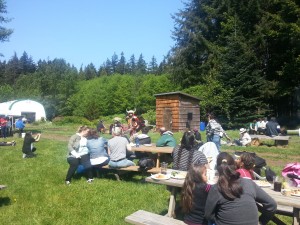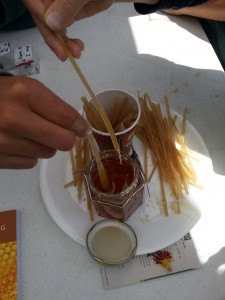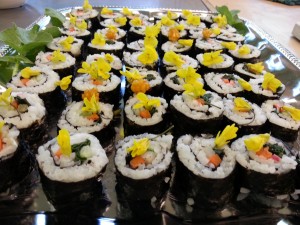It’s the final week of the CFE and to be quite honest it wasn’t the most exciting week. Much of the week was spent working on the final deliverable which included 3 complementary lessons and then a few additions to the existing farm tour specifically for secondary schools with a Home Economics focus.
Tuesday was the Blessing of Land, a part of the Indigenous Initiatives at the farm. I wasn’t present at the actual ceremony, however I did get to join in on the delicious food and festivities afterward. Because I know so little about the Indigenous peoples and how diverse they are, I’m always learning something new. I was able to watch a traditional dance and singing and drumming, though of what Peoples’ I cannot tell you. I don’t think I have ever seen a performance like this, so I am very glad I got the opportunity to. I also noticed that this was a very family-centered event. Some of the performers were father and son and many families attended the feast. I guess this is a way of passing on traditions and values and helping their youth understand where they come from and their own importance. At the end of the feast I was able to participate in blessing the land. The formal ceremony was already had earlier, but everyone was then invited to say a prayer, and offer tobacco into the fire.
Thursday was my second and last day part of the Intergenerational Landed Learning Project, and it was all about pollination! This week was really fun because the kids were able to get up close to a bee hive and see what was inside. I was so amazed by this group of grade 3 and 4s! They already knew so much about bees, such as how to tell them apart from wasps and what the role of each sex of the bee is. And almost all of them weren’t afraid of walking right up to the bee hive. I am scared of all insects, including ants sadly, and this really pushed me to get comfortable with the bees. Being around kids almost forced me to remain calm because if I start to freak out so would they, not to mention disturbing the bees. It’s interesting how different it is to work with a younger age group. They seem to always be so excited and ready to learn new things whereas the older groups lost interest or become more closed off to new experiences.
I was able to have a conversation yesterday with another CFE student and the manager of the Landed Learning Project summing up our experience at the farm. We both found it very enriching, and it was a great place to spend some time outside in the beautiful weather rather than inside the classroom. The manager then commented how it was almost a shame that only two secondary students chose to do their CFE at the farm, after which I thought Yeah! Why is that? I know that I will not be the only CFE student here as four are coming in June, but the next group are all elementary teachers. This ratio seems to almost reflect the groups that are at the farm right now. So many more elementary groups come through the farm than secondary groups, and I wonder if it’s the teacher and how they teach or structure their classrooms that have the biggest influence on the interest of the student. I also wonder if it’s the structure of secondary schools that limit teachers from bringing their classes outside. There are so many benefits to learning outside: hands on learning, the ability to make real-life connections, feeling more connected to their own surroundings. This really is something that should be done more in secondary school curriculum. This age group tends to get stuck in their immersion in technology; I think bringing this age group outside and helping them regain some kind of curiosity will help them become healthier and active citizens in the future.
I am so glad that I got the opportunity to be at UBC Farm for my CFE. I have learned so much and I hope to bring some of what I learned back into the classroom. Thank you!




